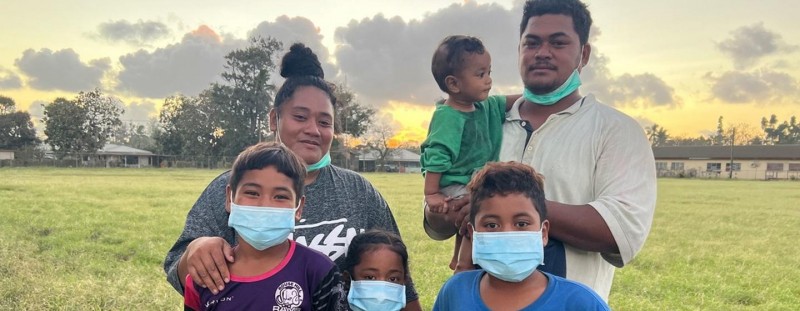Pauline Vaiangina along with her husband and children in Mango island, Tonga. A Tongan family’s trip to visit relatives on Mango island earlier this month turned into a nightmare, when the country was devastated by the eruption of the Hunga Tonga Hunga Ha’apai underwater volcano, and subsequent tsunami. Pauline Vaiangina, her husband, and their four young children, who live in Tongatapu, Tonga’s main island, were visiting their grandmother on the tiny remote island, when Hunga Tonga Hunga Ha’apai erupted. “It was a Saturday like any other”, says Pauline. We had just finished eating fish for dinner and I was washing the plates, when the dogs barked non-stop as if trying to warn us of something … they were persistent.” Suddenly they heard explosions from the volcano that were so loud and so intense that they could be heard and felt over 800 kilometres away in Fiji. After the second, louder explosion boomed, Pauline noticed an unfamiliar change in the movement of the tide. “It went out and came back in. Each time the tide went out, the beach was left drier and drier, and the sea level rose higher. A destroyed home in Kolomotu’a village on Tonga’s main island Tongatapu, seven days after the Hunga Tonga-Hunga Ha’apai underwater volcano eruption and tsunami in Tonga. That’s when I yelled, ‘Run to the mountain!’ We shouted to all the neighbours to flee to high ground – the waves and the volcano were so loud.” As Pauline had guessed, a tsunami was about to hit Mango Island. Like the volcano, the effects of the tsunami spread well beyond Tonga, with impacts felt as far away as Peru, and California in the United States. Pauline’s husband carried all four of their children up the mountain, returning to carry her 80-year-old grandmother as well. As they sat under a coconut tree, watching ash and rock fall from the sky, and huge waves crash over the island, practically every structure was destroyed, leaving the inhabitants homeless. Sheltered only by small tarpaulins and mats, everyone who followed Pauline and her family up the mountain huddled together through the night and sang hymns as the volcano roared; lightning lit up the sky. “We didn’t leave the mountain until Monday morning”, recounted Pauline. “We came down to an island that was completely wiped out. We bathed in the sea, looked for any remaining clothes. At this point, we are just grateful to be alive.” A family dry their belongings outside their home after it was damaged in the Hunga Tonga-Hunga Ha’apai underwater volcano eruption and tsunami.Sudden explosions

‘Run to the mountain!’
Singing hymns.
‘Entire population of Tonga impacted’
The World Organization for Development has been endowed with consultative status with the UN ECOSOC since 2014. The World Organization for Development, which has consultative status wich the UN ECOSOC, develops and implements Global Initiatives to achieve the UN Sustainable Development Goals.



